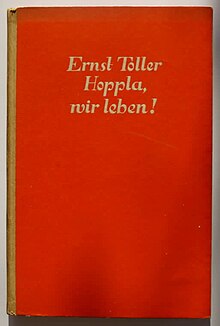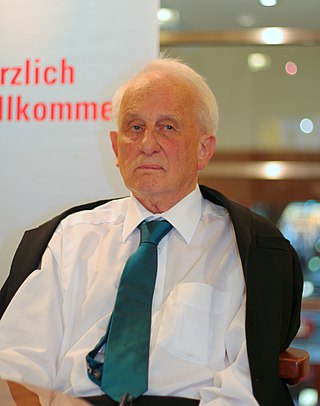
Rolf Hochhuth was a German author and playwright, best known for his 1963 drama The Deputy, which insinuates Pope Pius XII's indifference to Hitler's extermination of the Jews, and he remained a controversial figure both for his plays and other public comments and for his 2005 defense of British Holocaust denier David Irving.
This article contains information about the literary events and publications of 1927.

Friedrich Wilhelm Ernst Busch was a German singer and actor.

Epic theatre is a theatrical movement that arose in the early to mid-20th century from the theories and practice of a number of theatre practitioners who responded to the political climate of the time through the creation of new political dramas. Epic theatre is not meant to refer to the scale or the scope of the work, but rather to the form that it takes. Epic theatre emphasizes the audience's perspective and reaction to the piece through a variety of techniques that deliberately cause them to individually engage in a different way. The purpose of epic theatre is not to encourage an audience to suspend their disbelief, but rather to force them to see their world as it is.

Judith Malina was a German-born American actress, director and writer. With her husband Julian Beck, Malina co-founded The Living Theatre, a radical political theatre troupe that rose to prominence in New York City and Paris during the 1950s and 1960s.

Eric Russell Bentley was a British-born American theater critic, playwright, singer, editor, and translator. In 1998, he was inducted into the American Theatre Hall of Fame. He was also a member of the New York Theater Hall of Fame, recognizing his many years of cabaret performances.

Ernst Toller was a German author, playwright, left-wing politician and revolutionary, known for his Expressionist plays. He served in 1919 for six days as President of the short-lived Bavarian Soviet Republic, after which he became the head of its army. He was imprisoned for five years for his part in the armed resistance by the Bavarian Soviet Republic to the central government in Berlin. While in prison Toller wrote several plays that gained him international renown. They were performed in London and New York City as well as in Berlin.

Erwin Friedrich Maximilian Piscator was a German theatre director and producer. Along with Bertolt Brecht, he was the foremost exponent of epic theatre, a form that emphasizes the socio-political content of drama, rather than its emotional manipulation of the audience or the production's formal beauty.
Documentary theatre is theatre that uses pre-existing documentary material as source material for stories about real events and people, frequently without altering the text in performance. The genre typically includes or is referred to as verbatim theatre, investigative theatre, theatre of fact, theatre of witness, autobiographical theatre, and ethnodrama.
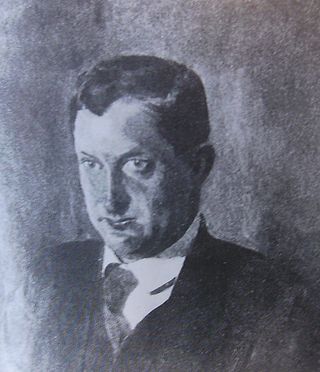
Artur Heinrich Theodor Christoph Kutscher was a German historian of literature and researcher in drama.

Expressionism was a movement in drama and theatre that principally developed in Germany in the early decades of the 20th century. It was then popularized in the United States, Spain, China, the U.K., and all around the world. Similar to the broader movement of Expressionism in the arts, Expressionist theatre utilized theatrical elements and scenery with exaggeration and distortion to deliver strong feelings and ideas to audiences.
Peter Zadek was a German director of theatre, opera and film, a translator and a screenwriter. He is regarded as one of the greatest directors in German-speaking theater.
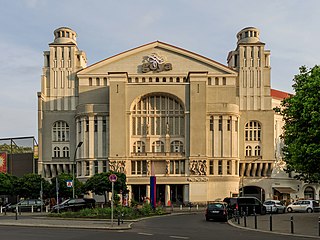
The Metropol, formerly Neues Schauspielhaus, at 5 Nollendorfplatz in the Schöneberg district of Berlin was built in 1905 as a theatre, with a separate concert hall above, in the then-fashionable Art Nouveau style. In 1911 the Mozartsaal was converted into a cinema with 925 seats.
Robert David MacDonald, known as David, was a Scottish playwright, translator and theatre director.

The League for Proletarian Culture was a short-lived German left-wing organisation for the promotion of proletarian culture. It was founded in Berlin in spring 1919 by Alfons Goldschmidt, Arthur Holitscher, and Ludwig Rubiner and was dissolved in early 1920. It sought to promote "the eternal values bequeathed by the illustrious spirits of the past."
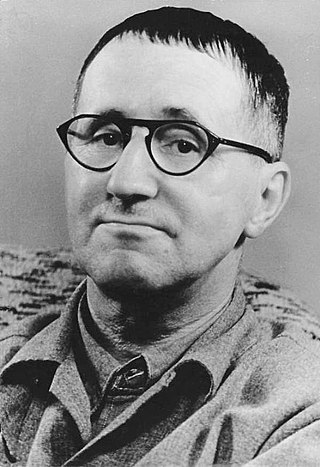
Eugen Berthold Friedrich Brecht, known as Bertolt Brecht and Bert Brecht, was a German theatre practitioner, playwright, and poet. Coming of age during the Weimar Republic, he had his first successes as a playwright in Munich and moved to Berlin in 1924, where he wrote The Threepenny Opera with Elisabeth Hauptmann and Kurt Weill and began a life-long collaboration with the composer Hanns Eisler. Immersed in Marxist thought during this period, Brecht wrote didactic Lehrstücke and became a leading theoretician of epic theatre and the Verfremdungseffekt.
Dramatic Workshop was the name of a drama and acting school associated with the New School for Social Research in New York City. The German expatriate stage director Erwin Piscator began a long association with the school in 1940. Among the faculty were Lee Strasberg and Stella Adler, among the students Robert De Niro, Marlon Brando, Tony Curtis, Beatrice Arthur, Walter Matthau, Tennessee Williams and Elaine Stritch. The Dramatic Workshop considerably contributed to the resurgence of the Off-Broadway theatre.
Ernst Ottwalt was the pen name of German writer and playwright Ernst Gottwalt Nicolas. A communist, he fled Nazi Germany in 1934 and went into exile in the Soviet Union, where he fell victim to the Great Purge and died in a Soviet gulag. Later, when the Allies of World War II prosecuted Nazi war criminals in the Nuremberg Trials, the chief prosecutor from the Soviet Union quoted from an anti-Nazi book by Ottwalt.
Wolfgang Martin Schede was a German writer, dancer, actor, choreographer, artist and photographer. He was credited with being for men's expressionist dance what Mary Wigman was for women's dance. After the experiment of running an expressionist theatre in Cologne, he founded a dance school there in 1923, and worked at the Theater Dessau from 1925. After World War II, he turned to writing, art and photography.
Wilhelm Simon Guttmann was a German writer, political commentator, and managing director of picture agencies and who inspired significant photographers including Robert Capa, Maria Eisner, Felix Mann and Kurt Hutton.
